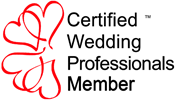
Photo by Life’s Big Events
So many couples are opting for destination weddings nowadays. It cuts down on the logistics of guests going to several locations, as well as, keeping them safe after a night of partying! So, unless you’re getting married within the Church, you will have to find someone to perform your ceremony and here are some pointers you should know about. I’ll start with the must-do’s required by the states in the U.S.A.
First: Each state or country has different rules: some will require residency of a week or two while others need a blood test. Some countries require a ceremony in the town hall as well as one in front of your guests. In the state of Maine, where I live, there are three professionals that are licensed or commissioned to perform wedding ceremonies. They are: any attorney who is a member of the Maine State Bar Association; a clergy of any denomination (that includes on-line ministeries) and a Notary Public. Generally speaking, you must go to a city or town hall to obtain your license and you must go in person, no-one can apply for you. If you’ve been married before, you must have a certified copy of your divorce or death certificate – a photocopy won’t do.
Second: Once you have your license, keep it in a safe place until you give it to your officiate, usually at the rehearsal the day before the wedding. Keep in mind that once you hand it over, you never see it again; it must be filed at the town hall by the person performing the ceremony. Many of the couples I marry come to me from other states or countries and so I always recommend that when they fill out their application with the town/city clerk they also request that a copy of the signed license be sent to their home. There is a nominal charge for this, but it gives you peace of mind; it also helps the bride if she is changing her last name. Keep in mind in most states if the couple shares the same address, then they must apply for the license in the town or city where they both reside.
Third: Don’t leave this important step ‘til the last minute, you should meet with your officiate early on in your planning, even before you apply for your license, after all, this is the most important and only legal part of the whole day!
I once had a couple that thought I applied for the license on their behalf and so, on the day of the wedding, the groom was shocked to find out their wedding would not be legal. Rather than tell the bride (who was busy getting ready for her big day) we went ahead with the ceremony – after all, all the guests were seated and waiting for her grand entrance – then we went to city hall the following Monday and did the whole thing again, this time with a license!
So, now that you have some idea of what is legally required, what questions should you ask of yourself and your officiant?
Most importantly: Does she know where your wedding ceremony will take place and is it within a reasonable driving distance? Be aware that many states have towns with the same or similar names – it would be nice for all of you to show up in the same place!
Do you feel comfortable with her? Does she seem genuinely interested in you as a couple? Does she want to know about how and where you met? Also, these are dynamic times and there are as many changes as there are traditions. When family units are dispersed there are issues with ex-families and step-families. An officiate is a third party that can help you “do the right thing” without hurting feelings; in your meetings, you should have a good sense of her thoughtfulness in this area.

Photo by Nance Trueworthy
Does she have sample ceremonies, vows & readings to get you started and to give you inspiration? At the same time, if you want to write your own vows, is that agreeable? Remember, this is your day and you get to choose!
Of course, budget is always an issue and there are different fees depending on the experience of the officiate – some only show up on the day – this is a potential disaster. You want her there at the rehearsal to show you how to line up, orchestrate when everyone walks in and to gently instruct the attendants on the correct way to behave – no gum, no alcohol… save that for the wedding party the next day! The officiate is a very important part of your wedding day and the 20 minutes or so that they’re performing your ceremony is just the tip of the iceberg. We’ll discuss all the details of the preparation that goes into that short time in another blog.
In the meantime – who is the person responsible for booking and paying the officiate? If you said ‘the groom’ you’d be right, but now it’s rarely the case – just one of those ‘changes’ that I mentioned earlier. Many years ago I had a bride that found out the hard way – one day before their ceremony I got a call from a large hotel in town. The event coordinator there asked me if I could perform the ceremony the next because the groom thought the bride was making the arrangements and vice versa. It so happened that I was running a half marathon the next day, but the wedding wasn’t until late in the day, so with some fancy footwork, I was able to get to the wedding on time. Lesson to learn: Book your officiate early!

Photo by Life’s Big Events




